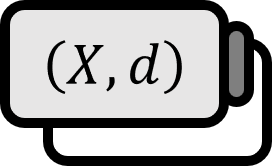Maximum and Minimum Theorem in Metric Spaces
Theorem
Let $X$ be a compact metric space, and let $f : X \to \mathbb{R}$ be continuous. Then, it is as follows.
$$ M = \sup \limits_{x\in X} f(x),\quad m=\inf \limits_{x \in X}f(x) $$
Then,
$$ M=f(p),\quad m=f(q) $$
there exists a $q,p\in X$ that satisfies this. In other words: for every $x$,
$$ f(q)\le f(x) \le f(p) $$
there exists a $q,p \in X$ that satisfies this. This is called the extreme value theorem.
Explanation
The compactness condition is necessary.
This theorem guarantees that $f(X)$ includes the maximum and minimum values of $f$. Without any conditions, by the definition of supremum and infimum, there is no guarantee that $M$, $m$ are included in $f(X)$, but the assumption that $X$ is compact and $f$ is continuous makes $M,m\in f(X)$ valid.
Proof
Since $f$ is continuous in a compact space, $f(X)$ is compact. According to the equivalent condition for compactness in Euclidean space, $f(X)$ is a closed and bounded set of real numbers.
Let $E$ be a non-empty set of real numbers and bounded above. And let $y=\sup E$. Then, $y \in \overline{E}$. Furthermore, if $E$ is closed, then $y \in E$.
Then, the proof is complete by the auxiliary theorem.
■
